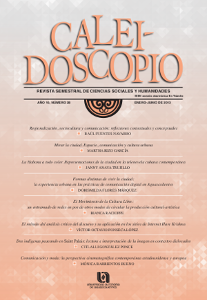Different ways of living the city: the urban experience in digital communication practices in Aguascalientes
DOI:
https://doi.org/10.33064/28crscsh479Keywords:
Internet studies, communication and city studies, urban experienceAbstract
This article focuses on the relation between the city and the Internet, by studying the practices of online communication related to the city, in three groups in Aguascalientes, México: Tequila Valley Aguascalientes, Movimiento Fotocaminante, and Bicicálidos. The theoretical framework is based on André Lemo ́s concept of informational territories and the methodological approach is a multi-sited ethnography. In the main outcomes, it is possible to identify different ways of living the urban experience linked to information and communication technologies. Also, it was observed that a collaboration culture and a collective concern for the city have emerged, from different perspectives such as the search for innovation and technological development, the defense of the environment and the right for mobility, as well as independent cultural proposals.Downloads
Downloads
Published
How to Cite
Issue
Section
License
Licencia Creative Commons Atribución-NoComercial-CompartirIgual 4.0 Internacional
El lector es libre de compartir o adaptar el material en cualquier medio o formato bajo las condiciones siguientes: (a) debe reconocer adecuadamente la autoría, proporcionar un enlace a la licencia e indicar si se han realizado cambios; (b) no puede utilizar el material para una finalidad comercial y (c) si remezcla, transforma o crea a partir del material, deberá difundir sus contribuciones bajo la misma licencia que el original.
Resumen de la licencia
https://creativecommons.org/licenses/by-nc-sa/4.0/deed.es_ES
Texto completo de la licencia
https://creativecommons.org/licenses/by-nc-sa/4.0/legalcode
Cada autor es responsable del contenido de su artículo. En el caso de un texto colectivo, el primer autor asume la responsabilidad intelectual de los resultados del proceso editorial; los autores son responsables de obtener la licencia de autor para reproducir materiales gráficos o fotográficos que pertenecen a terceros.
Los autores asumen plena responsabilidad en el caso de falsificación de datos o falta de autenticidad en la investigación. Se comprometen, también, a no reutilizar trabajos ya publicados, total o parcialmente, para presentarlos en otra publicación.
Estas condiciones aplican tanto a la versión impresa como a la versión electrónica de la revista.


















